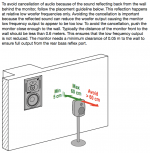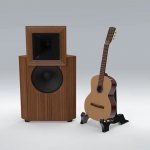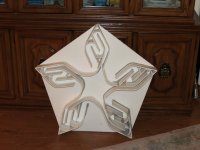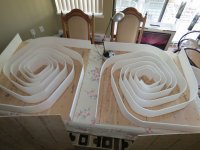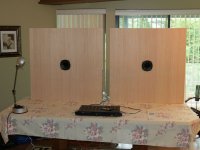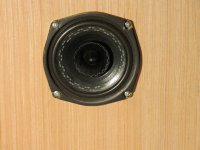Hi all, I’m looking for a DIY speaker design for a gnarly room. The front baffle of the speaker can only be 2ft (0.6m) from the wall behind it (at most), and the room is very wide. I’ve done some experimenting with my current speakers and reviewed the physics. Below I’ve listed what I think I want from a speaker, but I’ve had very little practical experience. So first, does this make sense given my space/restrictions? Second, do you have any recommendations for designs or kits that meet most of these criteria?
I’m looking for a speaker design with:
Thanks!
Joe
I’m looking for a speaker design with:
- Either baffle step correction resulting in a few db less across omnidirectional frequencies, or a long gently sloping bass roll off that will allow me to integrate the speaker and room gain with simple tone controls (this has worked well in my experimenting with the space).
- Tight, low distortion lows and mids so as not to compound speaker distortion with distortion from wall reflections.
- A wider and shallower cabinet as opposed to the very popular deep and skinny cabinets. A shallow cabinet will give me more room to tune with speaker position, and the larger front baffle will also help reduce omnidirectional frequencies.
- Wide directionality.
- “Bookshelf” design. It will be on stand. The larger end of “bookshelf” should be fine. I’m not interested in on wall or in wall speakers.
Thanks!
Joe
These sound like opposites. Maybe it goes to show how important these things become when you get close to walls. It therefore helps to learn what you must so you can be specific.
- the larger front baffle will also help reduce omnidirectional frequencies.
- Wide directionality.
why are you not interested in on wall designs?
As this helpfull diagram from Genlec shows the ideal is to get the speaker as close to the wall as posible for maximum boundry reinforcement and to push combing as high in frequency as posible (perhaps even high enough the speaker is directional and therfore you don't see the effect):

With EQ you can use any speaker you want but wider baffles and shallower enclosures will work better, waveguided tweeters are another feature you should look for.
As this helpfull diagram from Genlec shows the ideal is to get the speaker as close to the wall as posible for maximum boundry reinforcement and to push combing as high in frequency as posible (perhaps even high enough the speaker is directional and therfore you don't see the effect):
With EQ you can use any speaker you want but wider baffles and shallower enclosures will work better, waveguided tweeters are another feature you should look for.
Attachments
OK, so let me try that again.These sound like opposites. Maybe it goes to show how important these things become when you get close to walls. It therefore helps to learn what you must so you can be specific.
- A larger front baffle to reduce the frequencies (e.g., from 700Hz to 500Hz) that radiate omnidirectionally, and back towards the wall contributing to room gain.
- A speaker directionality of at least +/- 60 degrees across audible frequencies, so that there are multiple decent listening positions in this wide room.
Thanks. On wall designs feel inflexible to me. I often tune by moving and toeing the speakers. A standalone speaker can also be easily utilized in more rooms. I move not infrequently for work. I hope this changes one day and then I might consider on wall speakers if needed.why are you not interested in on wall designs?
As this helpfull diagram from Genlec shows the ideal is to get the speaker as close to the wall as posible for maximum boundry reinforcement and to push combing as high in frequency as posible (perhaps even high enough the speaker is directional and therfore you don't see the effect):
View attachment 1090262
With EQ you can use any speaker you want but wider baffles and shallower enclosures will work better, waveguided tweeters are another feature you should look for.
So Genlec is saying that you should avoid placing the front baffle less than 110 cm from the wall, but if you can't do that, you should place the front baffle as close to the wall as possible. This presumably drives the first reflection comb filter frequency low enough that the speaker output has been rolled off.
Not sure if the room I had the original Continuums in was as extreme as yours but it was much wider than it was deep and a listening distance of about 10 feet. I was frequently surprised how well they imaged as far off axis as about 45 degrees. I've also heard them on bookshelves, stands and right against the wall and they were great everywhere they landed. My main listening is of jazz and vocals as well and their well known reputation for vocal rendering is well deserved and I found well recorded jazz delicious. Small cabinet only 8 or 8.5 inches deep ... Continuum II could be great.
Haven't heard them but Zaph's SR71 comes with a couple of bsc crossover options for wall distances. Another option could be to make a cabinet more shallow but taller for a shorter stand to keep the baffle width the same for the developed crossover.
Haven't heard them but Zaph's SR71 comes with a couple of bsc crossover options for wall distances. Another option could be to make a cabinet more shallow but taller for a shorter stand to keep the baffle width the same for the developed crossover.
On wall speakers on a custom stand that makes it possible to place them right up against the wall?
I have considered building a pair to try this myself, but, time...
I have considered building a pair to try this myself, but, time...
Thank all. I have considered commercial on-wall speakers and I'm looking for a used set. This would let me experiment with them before investing the time and effort to DIY. BUT, there aren't many on the used market and the one's I've seen are often dedicated HT. I did talk to someone recently that had used on-wall speakers on stands as rears, so maybe they're more flexible than I'm thinking.
I have looked at the Continuum II, but they have a 100Hz-200Hz bump which I thought would make the room gain more difficult to manage with tone control.
I had read that Zaph use to offer multiple BSC designs that are no longer advertised. I'll look into this again. I built the ZA5.2 and was disappointed by the distortion which I found audible into the mids and downright muddy in the lows. I use them happily in my office for casual listing though. Thankfully the SR71 uses different drivers.
There are many commercially available speakers for near wall application. Are there really so few near wall DIY speaker designs?
It looks like the Selah Audio Purezza was designed for near wall application.
Troels has designed the 8008-Corner for near wall placement.
The HUMAN 81 is shallow, sealed, and available as a kit, but I can't find reliable measurements or even some of the basic specs online.
I have looked at the Continuum II, but they have a 100Hz-200Hz bump which I thought would make the room gain more difficult to manage with tone control.
I had read that Zaph use to offer multiple BSC designs that are no longer advertised. I'll look into this again. I built the ZA5.2 and was disappointed by the distortion which I found audible into the mids and downright muddy in the lows. I use them happily in my office for casual listing though. Thankfully the SR71 uses different drivers.
There are many commercially available speakers for near wall application. Are there really so few near wall DIY speaker designs?
It looks like the Selah Audio Purezza was designed for near wall application.
Troels has designed the 8008-Corner for near wall placement.
The HUMAN 81 is shallow, sealed, and available as a kit, but I can't find reliable measurements or even some of the basic specs online.
I have some K402 MEHs that I put in the corners of a 19' wide wall. they are 60x90 dispersion and use 2 15" woofers in each horn. I do not know what your budget is, but there is a long thread on making your own using old k402 horns (somewhat hard to find used, but doable).
Don't see it as a lack of polished advertisements but as a body of knowledge. DIYers that take this direction will go on to develop this and potentially achieve better results than are commercially available.Are there really so few near wall DIY speaker designs?
I don't know much about the use of horns with woofers. I suppose the horn also serves to lower the omnidirectional frequencies similar to a large front baffle. (?) I may need to do some research.I have some K402 MEHs that I put in the corners of a 19' wide wall. they are 60x90 dispersion and use 2 15" woofers in each horn. I do not know what your budget is, but there is a long thread on making your own using old k402 horns (somewhat hard to find used, but doable).
Member
Joined 2009
Paid Member
Why not an on-wall speaker placed on a stand next to the wall as the best compromise?
… Somebody may have relevant experience with a DIY Cornu speaker to share ?
https://www.diyaudio.com/community/...lding-a-cornu-spiral-horn-now-you-can.225622/
… Somebody may have relevant experience with a DIY Cornu speaker to share ?
https://www.diyaudio.com/community/...lding-a-cornu-spiral-horn-now-you-can.225622/
If I remember correctly the cornu was a design published in Speaker Builder magazine some 20 years ago.
@Cal Weldon has done a build.
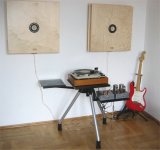
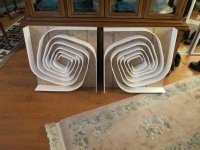
@Cal Weldon has done a build.


This is a very interesting design. Does anyone know of a multi-way implementation? I'm thinking in the same way that many horn loaded woofers have a tweeter or small full range module on top. I have a pair of fonken full range speakers I made with a CSS driver from a Planet10 design currently in this room. They don't seem to mind being near the wall, integrate well with my sub, and sound great when their happy, but when the music gets a little noisy, I find they get really noisy. For instance, when Brandi Carlile gets rocky, or Julia Jaklin brings in lots of synth noises they can sound very distorted. I'd like for my next build to be more versatile.… Somebody may have relevant experience with a DIY Cornu speaker to share ?
https://www.diyaudio.com/community/...lding-a-cornu-spiral-horn-now-you-can.225622/
I did four of the Cornu and a couple of similar types with the foam board. They are the funnest to build, sound great, are cheap to make and are super light. I did 20", 27" 36" and 48". Personally I found the 36" with the old RS 1354 driver the best. You could just add a tweeter with a small cap if you wanted.
I did that with the Penthorn. The horns weren't quite long enough to get extension they are great as party speakers, for sure.
I did that with the Penthorn. The horns weren't quite long enough to get extension they are great as party speakers, for sure.
Attachments
Scale down a pair of celestion ditton 15XR.Hi all, I’m looking for a DIY speaker design for a gnarly room. The front baffle of the speaker can only be 2ft (0.6m) from the wall behind it (at most), and the room is very wide. I’ve done some experimenting with my current speakers and reviewed the physics. Below I’ve listed what I think I want from a speaker, but I’ve had very little practical experience. So first, does this make sense given my space/restrictions? Second, do you have any recommendations for designs or kits that meet most of these criteria?
I’m looking for a speaker design with:
Drivers and crossover components costing less than $800 a pair is preferred. For what it’s worth, I listen at 75-80db about 10ft (3m) from each speaker. I listen to most genres, but my focused listening time is usually Jazz, Soul, and singer songwriter stuff in the Indie Rock and Folk genres. My amp should be able to drive any reasonable speaker (Sansui AU-x701).
- Either baffle step correction resulting in a few db less across omnidirectional frequencies, or a long gently sloping bass roll off that will allow me to integrate the speaker and room gain with simple tone controls (this has worked well in my experimenting with the space).
- Tight, low distortion lows and mids so as not to compound speaker distortion with distortion from wall reflections.
- A wider and shallower cabinet as opposed to the very popular deep and skinny cabinets. A shallow cabinet will give me more room to tune with speaker position, and the larger front baffle will also help reduce omnidirectional frequencies.
- Wide directionality.
- “Bookshelf” design. It will be on stand. The larger end of “bookshelf” should be fine. I’m not interested in on wall or in wall speakers.
Thanks!
Joe
This is the basic idea I started with based on this thread. Take a classic cabinet design, wide, shallow and generally meant for near wall application, and put modern low distortion drivers in it. But I was hoping to copy someone rather than do much designing myself. My shop (and I) will likely be busy till the end of the year. That gives me some time to weigh options or design a speaker.Scale down a pair of celestion ditton 15XR.
- Home
- Loudspeakers
- Multi-Way
- Speaker build suggestions for near wall application?
